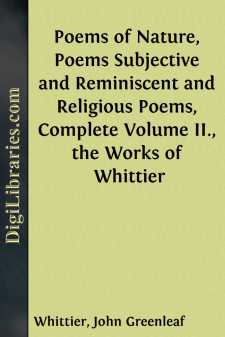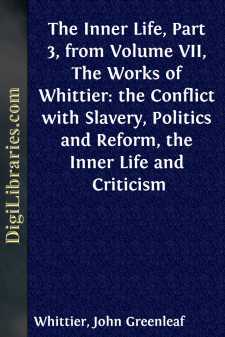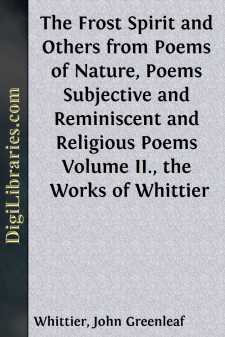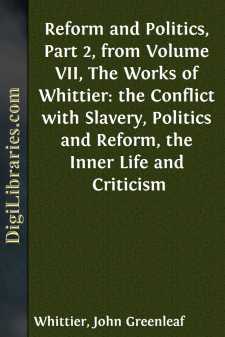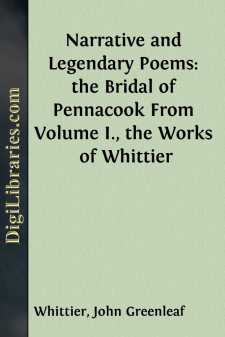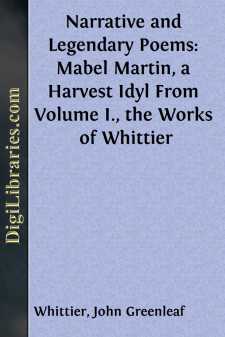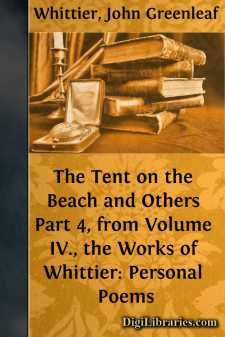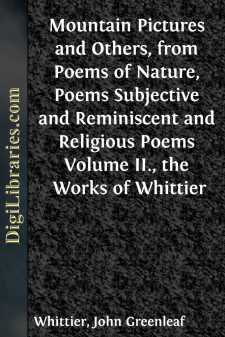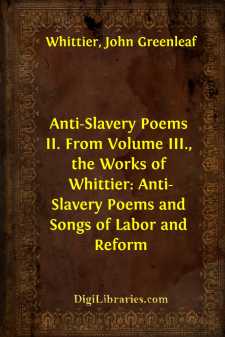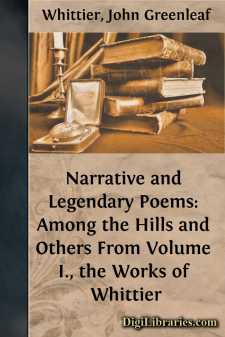Categories
- Antiques & Collectibles 13
- Architecture 36
- Art 48
- Bibles 22
- Biography & Autobiography 815
- Body, Mind & Spirit 144
- Business & Economics 28
- Children's Books 18
- Children's Fiction 14
- Computers 4
- Cooking 94
- Crafts & Hobbies 4
- Drama 346
- Education 58
- Family & Relationships 59
- Fiction 11834
- Games 19
- Gardening 17
- Health & Fitness 34
- History 1378
- House & Home 1
- Humor 147
- Juvenile Fiction 1873
- Juvenile Nonfiction 202
- Language Arts & Disciplines 89
- Law 16
- Literary Collections 686
- Literary Criticism 179
- Mathematics 13
- Medical 41
- Music 40
- Nature 179
- Non-Classifiable 1768
- Performing Arts 7
- Periodicals 1453
- Philosophy 65
- Photography 2
- Poetry 896
- Political Science 203
- Psychology 44
- Reference 154
- Religion 515
- Science 126
- Self-Help 85
- Social Science 83
- Sports & Recreation 34
- Study Aids 3
- Technology & Engineering 59
- Transportation 23
- Travel 463
- True Crime 29
John Greenleaf Whittier
John Greenleaf Whittier was a prominent 19th-century American poet and abolitionist known for his advocacy against slavery through both his literary works and political activism. Born in 1807 in Haverhill, Massachusetts, he was a key figure in the American literary movement and a founding member of the American Anti-Slavery Society. His best-known works include the poem "Snow-Bound," which nostalgically reflects on rural life and family, earning him widespread acclaim.
Author's Books:
Sort by:
THE FROST SPIRIT He comes,—he comes,—the Frost Spirit comesYou may trace his footsteps nowOn the naked woods and the blasted fields and thebrown hill's withered brow.He has smitten the leaves of the gray old treeswhere their pleasant green came forth,And the winds, which follow wherever he goes,have shaken them down to earth. He comes,—he comes,—the Frost Spirit comes!from the frozen...
more...
THE INNER LIFE THE AGENCY OF EVIL. From the Supernaturalism of New England, in the Democratic Review for 1843. IN this life of ours, so full of mystery, so hung about with wonders, so written over with dark riddles, where even the lights held by prophets and inspired ones only serve to disclose the solemn portals of a future state of being, leaving all beyond in shadow, perhaps the darkest and most...
more...
POEMS OF NATURE THE FROST SPIRIT He comes,—he comes,—the Frost Spirit comes You may trace his footsteps nowOn the naked woods and the blasted fields and the brown hill's withered brow.He has smitten the leaves of the gray old trees where their pleasant green came forth,And the winds, which follow wherever he goes, have shaken them down to earth. He...
more...
REFORM AND POLITICS UTOPIAN SCHEMES AND POLITICAL THEORISTS. THERE is a large class of men, not in Europe alone, but in this country also, whose constitutional conservatism inclines them to regard any organic change in the government of a state or the social condition of its people with suspicion and distrust. They admit, perhaps, the evils of the old state of things; but they hold them to be...
more...
THE BRIDAL OF PENNACOOK. Winnepurkit, otherwise called George, Sachem of Saugus, married a daughter of Passaconaway, the great Pennacook chieftain, in 1662. The wedding took place at Pennacook (now Concord, N. H.), and the ceremonies closed with a great feast. According to the usages of the chiefs, Passaconaway ordered a select number of his men to accompany the newly-married couple to the dwelling of...
more...
MABEL MARTIN. A HARVEST IDYL. Susanna Martin, an aged woman of Amesbury, Mass., was tried and executed for the alleged crime of witchcraft. Her home was in what is now known as Pleasant Valley on the Merrimac, a little above the old Ferry way, where, tradition says, an attempt was made to assassinate Sir Edmund Andros on his way to Falmouth (afterward Portland) and Pemaquid, which was frustrated by a...
more...
THE TENT ON THE BEACH It can scarcely be necessary to name as the two companions whom I reckoned with myself in this poetical picnic, Fields the lettered magnate, and Taylor the free cosmopolite. The long line of sandy beach which defines almost the whole of the New Hampshire sea-coast is especially marked near its southern extremity, by the salt-meadows of Hampton. The Hampton River winds through...
more...
MOUNTAIN PICTURES. I. FRANCONIA FROM THE PEMIGEWASSETOnce more, O Mountains of the North, unveilYour brows, and lay your cloudy mantles byAnd once more, ere the eyes that seek ye fail,Uplift against the blue walls of the skyYour mighty shapes, and let the sunshine weaveIts golden net-work in your belting woods,Smile down in rainbows from your falling floods,And on your kingly brows at morn and eveSet...
more...
TEXAS VOICE OF NEW ENGLAND. The five poems immediately following indicate the intense feeling of the friends of freedom in view of the annexation of Texas, with its vast territory sufficient, as was boasted, for six new slave States. Up the hillside, down the glen,Rouse the sleeping citizen;Summon out the might of men! Like a lion growling low,Like a night-storm rising slow,Like the tread of unseen...
more...
PRELUDE. ALONG the roadside, like the flowers of goldThat tawny Incas for their gardens wrought,Heavy with sunshine droops the golden-rod,And the red pennons of the cardinal-flowersHang motionless upon their upright staves.The sky is hot and hazy, and the wind,Vying-weary with its long flight from the south,Unfelt; yet, closely scanned, yon maple leafWith faintest motion, as one stirs in...
more...


